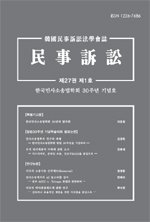학술논문
제1심법원의 소각하판결에 관한 항소심의 판단
이용수 22
- 영문명
- Judgment of Appeal Against the Judgment of the Court of First Instance Dismissing the Lawsuit: On the Premise of the Principle of Verbot der Reformatio in Peius
- 발행기관
- 한국민사소송법학회
- 저자명
- 이찬양(Chan Yang Lee)
- 간행물 정보
- 『민사소송』제28권 제2호, 209~262쪽, 전체 54쪽
- 주제분류
- 법학 > 법학
- 파일형태
- 발행일자
- 2024.06.30
9,280원
구매일시로부터 72시간 이내에 다운로드 가능합니다.
이 학술논문 정보는 (주)교보문고와 각 발행기관 사이에 저작물 이용 계약이 체결된 것으로, 교보문고를 통해 제공되고 있습니다.

국문 초록
The plaintiff filed an appeal against the lawsuit decision, and the appellate court heard it. As a result, the lawsuit requirements were not found to be defective, unlike the judgment in the first trial, but there are cases where the claim on the merits is without merit. In this case, if the appellate court rules without remanding the claim, the issue may be whether the claim is groundless and whether the claim should be dismissed or the appeal should be dismissed.
Regarding this topic, the theory of dismissal of claim and the theory of dismissal of appeal are conflicting. Accordingly, from the perspective of the legal principles of claim dismissal, the rationality and validity of the following propositions related to the main issues in this paper were reviewed. Regarding this topic, the possibility of a change in the so-called appeal trial from dismissal of appeal to dismissal of claim, ⅰ) aspects of fairness, equity, and legal status between the parties, ⅱ) aspects of discussions in the trial court and the appellate court, ⅲ) substantive aspects of the dispute and litigation. It was reviewed in terms of economic and legal substantive solutions.
In terms of fairness, equity, and legal status between the parties, first, if the plaintiff appeals against the court of first instance's decision to quash, as a result of the appellate court's review of the case, the requirements under the proviso to Article 418 of the Civil Procedure Act are met, that is, i) the first trial. If the trial has been conducted to the extent that a judgment on the merits can be made, or ⅱ) if there is consent from the parties, making a decision to dismiss the claim does not change it to the plaintiff's disadvantage. Second, if the appellate court interprets that it can only pronounce a judgment on the merits in favor of the appellant, this does not comply with the purpose of Article 418 of the Civil Procedure Act. Third, when the plaintiff appeals the trial court's decision to quash the claim, the appellate court's decision to dismiss the claim does not mean that the plaintiff is treated more unfairly than the defendant. Fourth, if the appellate court decides to dismiss the claim, the legal status granted to the appellant, the plaintiff, under substantive law is not deprived. This is judged to be a reasonable interpretation based on the provisions of the Civil Procedure Act and does not violate the principle of prohibiting disadvantageous changes. Fifth, if the appellate court decides to dismiss the appeal, it becomes difficult to quickly and finally resolve the dispute between the parties, and above all, the burden of having to respond again arises on the defendant. Sixth, if only the defendant appeals against the first trial's dismissal judgment with the intention of seeking a judgment to dismiss the claim, and if the trial results show that the lawsuit is legal and the plaintiff's claim is well-founded, the requirements of the proviso to Article 418 of the Civil Procedure Act are satisfied. As a premise, it is reasonable to interpret the appellate court to cancel the first trial decision and make a ‘judgment citing claims.’ In terms of discussions in the trial court and the appellate court, first, if the decision to dismiss the appeal is confirmed in the appellate trial, there may be a limit to the decision to dismiss the appeal, which was previously erroneously judged by the trial court, due to res judicata. Second, applying the remand theory would only result in postponing or delaying disadvantageous changes that the appellate court could not make to the plaintiff to the trial court, which could unnecessarily make the process more cumbersome.
영문 초록
목차
Ⅰ. 서론
Ⅱ. 소송판결과 기판력 및 불이익변경금지 원칙 - 비교법적 검토를 포함하여
Ⅲ. 불이익변경금지원칙 전제하에 소각하판결의 항소심의 판단 방법에 관한 비교법적 검토
Ⅳ. 항소심에서 청구기각 판결로의 변경 가능성 - 불이익변경금지 원칙의 시각을 겸하여
Ⅴ. 결론
키워드
해당간행물 수록 논문
참고문헌
교보eBook 첫 방문을 환영 합니다!

신규가입 혜택 지급이 완료 되었습니다.
바로 사용 가능한 교보e캐시 1,000원 (유효기간 7일)
지금 바로 교보eBook의 다양한 콘텐츠를 이용해 보세요!



